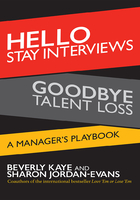
Follow the Blinking Word
 Are you often praised for being a terrific listener? If so, skip this section. But if not, read on.
Are you often praised for being a terrific listener? If so, skip this section. But if not, read on.
Everyone agrees that active listening is foundational to effective management. That’s why building that skill is core to every good leadership development program. Yet managers continually struggle with it. Some have simply not practiced it enough or had honest feedback about how often and how effectively they listen. Others let their fast-paced workdays squeeze out listening time. They rely on assumptions and quickly push to conclusions. They might save time, but they often miss the message or the meaning behind the message.
We have a recommendation. We suggest that you follow the blinking word. As your talented employees answer your questions, you’ll notice words that “blink.” Ask questions about those words. Here’s how it worked for one manager and his talented employee.

MANAGER: What’s the best part of your day?
EMPLOYEE: I really like it when I get to solve a complex problem, one where I need to bring in colleagues to really get to the bottom of it.
Which words blink, or stand out? Which pique curiosity or invite more discussion? Some of you will say the words that blink in this example are complex or problem or complex problem. Others will hear bring in colleagues as the blinking words. Any of these words could work.
Notice how this manager follows the blinking word and dives in—and then watches again for the blinking words and follows one with a question.
MANAGER: Say more about your interest in solving complex problems. Not everyone enjoys that. When did that start for you?
EMPLOYEE: I guess that ever since I was a kid I’ve enjoyed it. I used to love those puzzles, like Rubik’s Cube, that drive some people crazy. My friends and I would sometimes work together on it. Other times we’d compete and see who could finish first.
MANAGER: Ah—so the puzzles and competition started in your childhood. How do those experiences translate to your current job?
EMPLOYEE: Well, first of all, I have plenty of Rubik’s Cubes in this job! And my colleagues can often help me solve the problem. That’s great, and there’s an element of fun for me when I’m collaborating with others.
The manager has so many possible paths to follow now. The secret is to not move to a completely different question (or topic) right away but to truly stay the course, listen for another blinking word, and dive in. Employees will feel heard and better understood in an exchange like this.
One manager asked, “What if I ask the wrong question and go down the wrong path?” Don’t worry. Your employee will help you course-correct, as in this next example.
MANAGER: So, would you like to have more of your work be team-based rather than solo? If so, how much more?
EMPLOYEE: Well, not necessarily. If a problem is pretty straightforward I’d rather just do it and get it behind me. I want others in the mix when the problem is complex and many heads are better than one.
MANAGER: Great. This is so helpful. Let’s continue talking about which projects you’d like to team on and which you’d rather do on your own.
Notice how the manager used primarily open questions while following the blinking words. Open questions begin with words such as how, why, where, when, and tell me about. They are designed to avoid yes-or-no responses, which often lead to a dead end. As you follow the blinking word, you go deeper into your employees’ situations. Meanwhile, they feel listened to. They believe that you care about their interests and goals.
The blinking word technique will encourage you to listen empathetically, at the deepest level. You will not be able to tune in and out and still follow the blinking word. (P.S. Do try this at home. Your spouse, kids, and friends will be pleasantly surprised at what a good listener you have become.)
